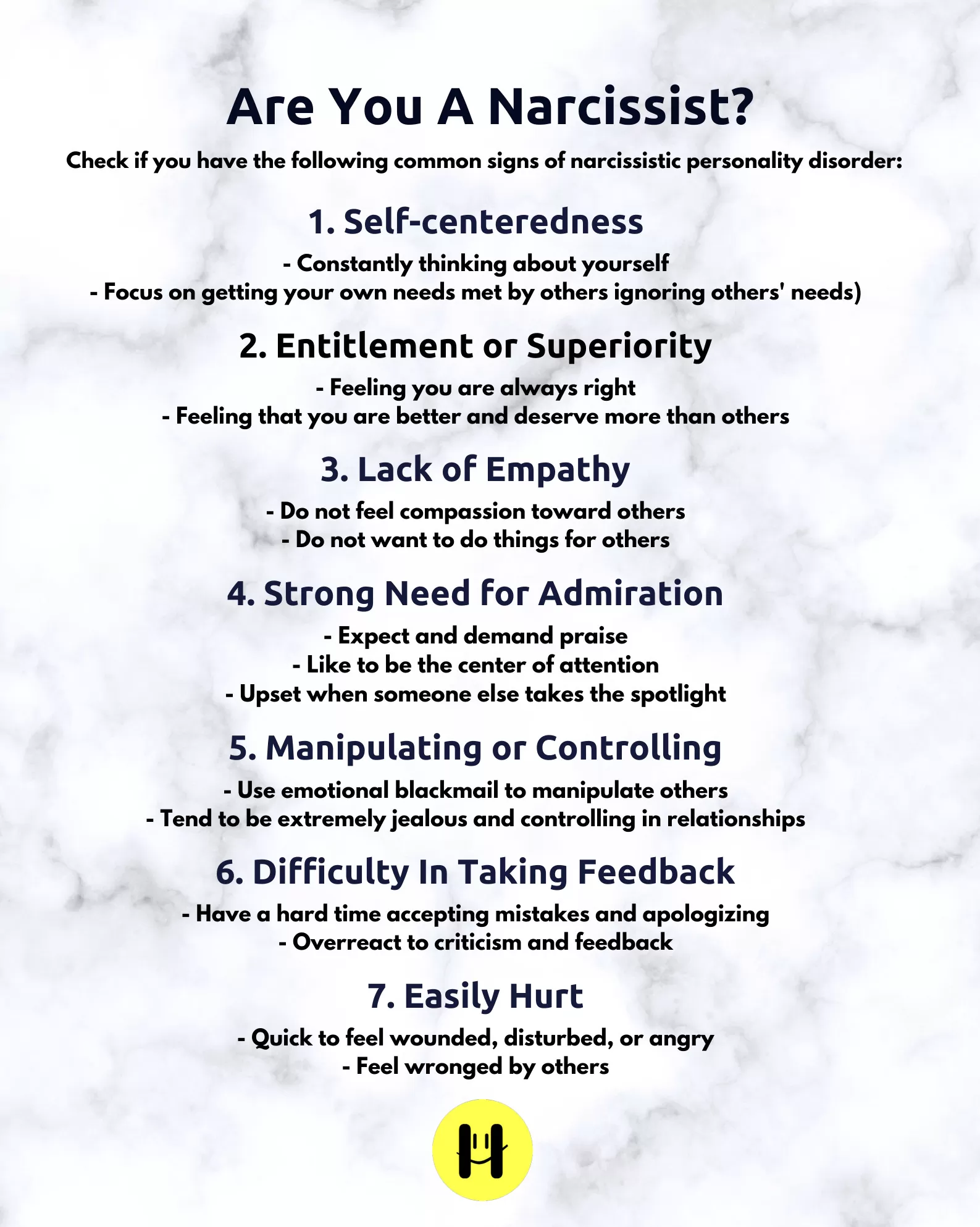📅 12 Jan 2025 • 📖 14 min read
— By Dr. Sandip Roy.Narcissists expect special treatment because they feel they are VIPs. But this is not the worst part.
The worst part is that they give a darn about what pains others went through to give them that special treatment.
Female narcissists take this self-centeredness to a different level — thinking, feeling, and acting like they are the center of the universe.
- A narcissist female is a high-value enchantress who trashes others falling short of her lofty standards.
- She is high-maintenance, highly self-conscious of her public image, and thrives on positive attention.
- If you love her, know that she can’t love you back, and all the love in the relationship goes to them.
- Her charm, innocence, and “pitifulness” hypnotize you into forgiving her even without her asking.
- Beware, she can crush you for criticizing her self-glorification. Her rude words can leave you emotionally disturbed for days.
Psychologist W. Keith Campbell brought narcissism into the public limelight in the early 2000s. Since then, research has given us ways to predict fairly well how narcissistic people would act in specific situations.
7 Signs of A Female Narcissist
1. Make Excellent First Impressions.
A woman narcissist can be utterly charming when you first see her.
It’s a fact that they make great first impressions with people they meet for the first few times. Even if she’s not naturally beautiful, she will use all the tools of make-up science to look irresistible.
“Narcissists are popular at zero acquaintance.”
— Back, Schmukle & Egloff (2010)
Narcissistic women, especially the grandiose types, can look drop-dead gorgeous even when they are just waking up.
At a dinner party, one look, and you are trapped in their Medusa-like charms.
She will most likely have an eager group listening to her, with many others eyeing her — men in desire and women in jealousy. She can make her audience forget about the dinner.

They also seem to have more friends on social media. Her type of woman is all over TikTok and Reels, pouting, dancing, or slow-mo catwalking in exotic places.
Researchers know that people high in some dark personality traits, such as narcissism and psychopathy, can be physically attractive. Back & colleagues found that obvious narcissistic behaviors include:
- a charming smile,
- self-assured body movements, and
- upright body posture.
Holtzman and Strube found evidence suggesting narcissists are more attractive than the average person (Narcissism and Attractiveness, 2010).
Vazire and the team found that narcissists associate with attractive physical appearance and are more likely to wear expensive clothes and present a neat and tidy appearance (Portrait of a Narcissist, 2008).
McCain & Campbell (2016) found that people high in grandiose narcissism tend to have more friends on social networking sites than people low in grandiose narcissism.

Dr. J. Fox, Ph.D., is a licensed psychologist in Texas, says:
- Female narcissists have a deep impact on relationships, particularly on finances and fidelity/cheating.
- Appearance is central to them. They seek recognition for their looks and can react aggressively when their spotlight is taken away.
- They use their appearance to allure and manipulate others, often displaying jealousy when attention shifts.
- They selectively use seduction to attach themselves to objects of high value. They cannot process shame normally.
- They often gain confidence by showing others down and anointing themselves with a sense of superiority.
- They battle for dominance and supremacy, often triggered by deep-seated insecurity and inferiority. They usually spend excessive money to maintain a “better-than-you” public image.
- Female narcissists (as well as male narcissists) have a higher likelihood of committing adultery due to their constant pursuit of higher-status objects or individuals.
- Parenting among narcissistic females can involve favoring one specific child, causing feelings of inadequacy in other children and an odd sense of mothering.
2. Are Bad As Long-Time Partners.
It takes about two weeks to discover that the alluring woman you’re going out with is a selfish vixen.
In 1996, Murray & Holmes found that narcissists are more likely to have conflicts in their long-term relationships with coworkers, friends, and romantic partners.
In 1998, psychologist Delroy Paulhus observed that people found narcissists likable, well-adjusted, and competent on the first meeting. However, after 7 weeks, people seemed to have unmasked them and were rating them negatively.
In 2003, Baumeister & Campbell found that narcissists frequently alienate others in the long run.
Not surprisingly, Campbell, Rudich, and Sedikides (2002) write that narcissists are more likely than non-narcissists to be unfaithful and cheat on you in a relationship.
3. Are Impulsive Flirts and Habitual Cheaters.
Woman narcissists are often habitual cheaters.
If caught, they would completely deny everything, leaving you wondering for weeks and months if you really saw her cheating on you or if your mind was playing tricks on you.
And if you confront them with irrefutable evidence, they put the entire blame on you for “making them cheat” on you.
The reason, they crave and thrive on attention — and the more people praise them, the merrier it is.
Narcissists thrive on attention. However, it is only positive attention that they seek, and they are in a hurry to obtain it.
“I like to be the center of attention. Let me show how it’s done.”
— Any narcissist woman
Of course, if they expect to receive negative attention or no attention (since they excel at sensing the mood of a room), they may simply leave the place quietly.
In 2006, Vazire & Funder found that narcissists tend to be impulsive and seek short-term gains.
Bushman, Bonacci, van Dijk, & Baumeister, 2003, found that narcissists were somewhat more likely to have sexually coercive tendencies.
They want to get physically intimate sooner than normal.
Experts think this could be because narcissists recognize they would be disliked in the long run, hence they tend to have short-term mating patterns, which may have molded their narcissism over evolutionary time.
Holtzman and Strube (2012) write,
“This study provides the first experimental evidence that dark personalities construct appearances that act as social lures—possibly facilitating their cunning social strategies.”

4. Exaggerate Their Personal Capabilities And Worth.
While all of us generally like to see ourselves in a positive light, narcissists have unrealistic ideas about themselves. A typical woman narcissist would say things like:
“I bring life to a party. All know that I am the centerpiece of attraction.”
“I know I am good because everybody keeps telling me so.”
“I have a million followers. How many do you have?”
“I have a natural talent for influencing people.”
“I can usually talk my way out of anything.”
A narcissistic woman will overplay her talents and never miss a chance to show she knows more than you.
This self-enhancement act motivates them to feel good about themselves and to maintain self-esteem.
Research suggests there are 2 types of self-enhancers — moralistic and egoistic. Narcissists are egoistic ones.
However, narcissistic women do not exaggerate their abilities to impress you; they truly believe they are superior to you.
Self-deception is a part of narcissistic behavior. In that sense, she is not lying about their superior abilities (because she lives in a grand bubble of her own making).
5. Swear More And Behave More Rudely.
Narcissists use more swear words and anger words in their daily conversations.
They also argue more. The swearing and arguing behavior, however, is more common in male narcissists.
Research by Holtzman and Vazire found that “narcissism correlated with greater sexual language use. This relationship was similar in magnitude for both men and women, and was strong for the exploitativeness or entitlement and leadership or authority facets.”
Surprisingly, the authors surmise:
“It is possible that sexual language use is a manifestation of (or simply bolsters) the proposed evolutionary function of narcissism: short-term reproduction.”
6. React Negatively To Any Criticism or Feedback.
Female narcissists cannot accept any criticism as feedback.
If you tell them what’s wrong with their behavior, they will hate you and insult you for doing that.
“You always bring me down. It’s in your nature.”
And if they asked for your opinion, then you are as good as standing as a target in front of a loose cannon.
“Do I look fat?”
The woman narcissist who posed the question above may attack you viciously if you responded with a “Yes.”
In 2003, Baumeister and colleagues found that narcissists were more likely to bully others. They may also respond very negatively to criticism.
Surprisingly, narcissists seem to recognize the “narcissistic” parts of their behaviors, despite engaging in such behaviors, as pointed out by Carlson, Vazire, & Oltmanns in 2011.
So, in all likelihood, a narcissistic woman you are close to will be aware of her behaviors that others find obnoxious.
And they can be frankly honest about it.
“I realize I’m a jerk at times. I am also my worst critic, because it hurts less when I criticize myself than when others do.”
7. Unwilling To Change For The Better.
If you’re hanging with them in the hope that they will change, you are living in a delusion. They won’t change for you or anyone else.
While they are aware of their flaws, narcissistic women do not want or even wish to improve.
First, they will attack your ideas about them changing for the better.
Second, they will never agree to seriously evaluate themselves. They know that if they analyze themselves, they might be forced to change.
It is significantly easier for them to sustain their negative behavior and protect themselves from anyone who might harm their low self-esteem.
The best person to motivate her to change her behaviors so that she is less irritating and toxic to others is her mental health therapist, not you.

Fox’s 7 Most Common Narcissistic Traits
Dr. Daniel Fox says female narcissists have these 7 traits:
- Competitiveness: Female narcissists thrive on competition, particularly with other women. They always look to dominate in many aspects of life — career, community roles, personal relationships. They can boil over in anger when proven wrong, especially in their perceived domain of influence.
- Obsession with Appearance: They focus heavily on their physical appearance, often using plastic surgeries and heavy social media photo-filters. They crave attention and recognition for how they look and dress. You can rarely see them without make-up.
- Seduction: They use their bodies and charm to lure in a mate or to achieve a specific goal. They are seductive and inviting in a selective and strategic way.
- Confidence: Their sense of confidence comes from comparing themselves favorably to others, and they feel superior when others are perceived as inferior.
- Money: They view money as a measure of status and power, often spending excessively on flashy items to maintain an image of high status, despite the financial consequences.
- Fidelity Issues: Narcissistic females may act like “black widow spiders,” idealizing their partners initially but eventually becoming dissatisfied and seeking higher-status individuals, leading to infidelity.
- Parenting Style: They raise their children to reflect their own narcissistic desires, typically picking a favorite child and focusing on their achievements rather than emotional bonding. Their children often grow up with intense pressure to succeed, perfectionism, insecure self-worth, and other issues.
10 “Lesser-Known” Signs of A Female Narcissist
- Center of Male Attention: She often has a group of male admirers and uses these friendships to gain attention and create tension with her partner, a tactic known as triangulation.
- Perpetual Victim: There’s always something wrong with her. By constantly claiming to be sick, tired, or troubled—a behavior known as malingering—she seeks sympathy and emotional support, playing the damsel-in-distress to capture everyone’s attention.
- Empath Complex: Despite her self-perception as highly empathetic, her understanding of emotions is often used to manipulate others. She is keenly aware of how she’s perceived and uses it to her advantage.
- Unacknowledged Privilege: She frequently complains about life being unfair and how the world hasn’t given them what they deserve, all the while showing little to no empathy for those less fortunate.
- Social Media Exhibitionist: Her presence is noticeable on platforms like TikTok and Instagram Reels, often seen pouting, dancing, or showcasing herself in glamorous settings.
- High-Maintenance Persona: She thrives on constant positive reinforcement, and while she may charm you initially, she won’t hesitate to belittle anyone who dares to criticize her.
- Relationship Saboteur: In intimate relationships, her manipulative behavior can be detrimental to your mental well-being, often leading to a loss of peace and sanity.
- Solipsistic Worldview: She exists in a bubble of self-importance, with a genuine inability to connect with or understand the emotions and needs of others.
- Unrequited Love: In a romantic relationship with her, love is a one-way street. You may give it your all, but her incapacity to reciprocate can leave you emotionally depleted.
- Cutting Words: She has a knack for making comments that can unsettle you emotionally, sometimes affecting you for days.
10 “Culturally Hidden” Signs of A Narcissist Woman
Modern society sees many signs of a narcissistic woman as commonplace behaviors. It makes these seemingly normal signs less likely to be critically examined, hiding their potentially tocix nature.
- She is quick and skilled at switching her roles to appear as a victim.
- She claims that everyone else is envious/jealous of her and intends to rob her.
- She can be materialistic and treat you well as long as you can buy her expensive stuff.
- She can rightfully withhold intimacy as punishment for not being as obedient as she wants.
- She can talk mostly about herself and her boundaries and can refuse to respect your boundaries.
- She can feel indifferent or pretend to be upset about your hardships, as she enjoys your suffering.
- Her sensitivity to criticism is very high, and she does not tolerate even the most minor annoyances.
- She can make you dependent on her, insult you both privately and publicly, to keep you on a leash.
- She can ask you to reveal your secrets and freely use them against you if they lose control over you.
- She can blame you for her mistakes and criticism from others while having microaggressions for you.
FAQs
What creates a female narcissist?
A typical narcissist is often the result of arrested emotional development. Experts believe that when the evolution of empathy remains incomplete in a child, mostly because of parental neglect or abuse, narcissistic traits emerge in adulthood.
A tough childhood can make anyone of any gender a narcissist. So, a female narcissist is not much different from a male narcissist.
What is a relationship with a female narcissist like?
A relationship with a female narcissist can be challenging. She can make you lose your mental sanity and peace.
She struggles to love her partner truly. She treats her partner as an extension of herself — not a separate person with their own needs.
The relationship solely exists to satisfy her needs and meet her demands for attention and admiration. She can even manipulate her partner to keep control.
How do you know if you’re in a relationship with a female narcissist?
Key signs include a lack of empathy, constant need for admiration, entitlement, and often, manipulative or controlling behavior.
She also reacts negatively to criticism and prioritizes her needs over yours.
She falsely inflates her self-worth and lives in a grandiose bubble of self-glorification.
Can a relationship with a female narcissist improve?
Improvement is challenging because narcissists rarely see the need for change. They think that changing themselves means admitting they are not good enough, which is self-deprecation.
However, a few things can help improve interactions: communicate clearly and assertively, set firm boundaries, avoid getting into arguments, and try not to take her behavior personally. Seeking professional help (like couples therapy) can be a viable option.
Further Reading:
- Narcissistic Personality Disorder by Paroma Mitra & Dimy Fluyau.
- Narcissistic Personality Disorder in Clinical Health Psychology Practice by Elizabeth L. Kacel, Nicole Ennis, and Deidre B. Pereira
Final Words
A relationship with a female narcissist can lead to emotional distress, lowered self-esteem, and a feeling of being undervalued.
Narcissists may openly admit to some behaviors, like seeking short-term relationships. But, we can’t expect them to be entirely honest about other aspects of their daily life.
We urge you to never self-diagnose or diagnose others as NPD based on information found online. Please seek a mental health expert’s advice to identify and treat your issues.
Finally, you may have thought of a self-centric person who should read this. This research-based piece might appeal to them and help them get insights into themselves. Could you pass it on to them?
√ Please share it with someone if you found this helpful.
√ Also Read: 20 Female Narcissist Cheating Patterns
• Our Story!

